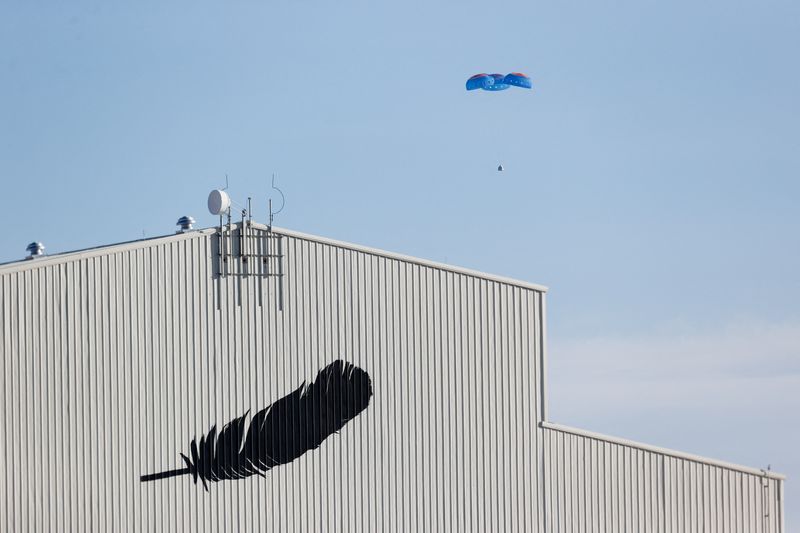US FAA ends probe of Blue Origin’s 2022 rocket mishap, needs engine redesign
2023.09.27 18:39

© Reuters. FILE PHOTO: The space capsule of Blue Origin’s rocket New Shepard, carrying six crew members, is seen before landing, on billionaire Jeff Bezos’s company’s fourth suborbital tourism flight, near Van Horn, Texas, U.S., March 31, 2022. REUTERS/Ivan Pierre A
By Joey Roulette
WASHINGTON (Reuters) -The U.S. Federal Aviation Administration said on Wednesday it has closed a probe into Blue Origin’s 2022 New Shepard rocket failure, forcing a redesign of the vehicle’s engine and other fixes before the company can resume its suborbital launch business.
Blue Origin must take 21 corrective actions before its reusable New Shepard rocket can return to flight, including a “redesign of engine and nozzle components to improve structural performance during operation as well as organizational changes,” the FAA said.
A Blue Origin spokesperson said “we’ve received the FAA’s letter and plan to fly soon” but did not answer questions on whether any of the corrective actions had already been made or what organizational changes the FAA is requiring.
The New Shepard, which flies cargo and humans on short trips to the edge of space, has been grounded since a September 2022 uncrewed mission failed roughly a minute after liftoff from Texas, forcing the rocket’s capsule full of NASA experiments to safely eject mid-flight.
In March, Blue Origin said New Shepard would fly “soon” after concluding the mishap was caused by a “structural failure” in the rocket’s engine nozzle, which had been contorted during flight by hotter-than-normal temperatures coming out of the engine’s combustion chamber.
The FAA, which regulates launch site safety and oversees mishap investigations led by rocket companies, cited the same conclusion as Blue Origin’s in its statement on Wednesday. The company cannot obtain a license to fly until it demonstrates all the required fixes have been made, it added.
The failure occurred on New Shepard’s 23rd flight from rural Van Horn, Texas, as flights with the 60-foot (18-meter) tall rocket-capsule system were becoming routine. The company has flown multiple crews of people, including paying customers and its founder, Jeff Bezos.








